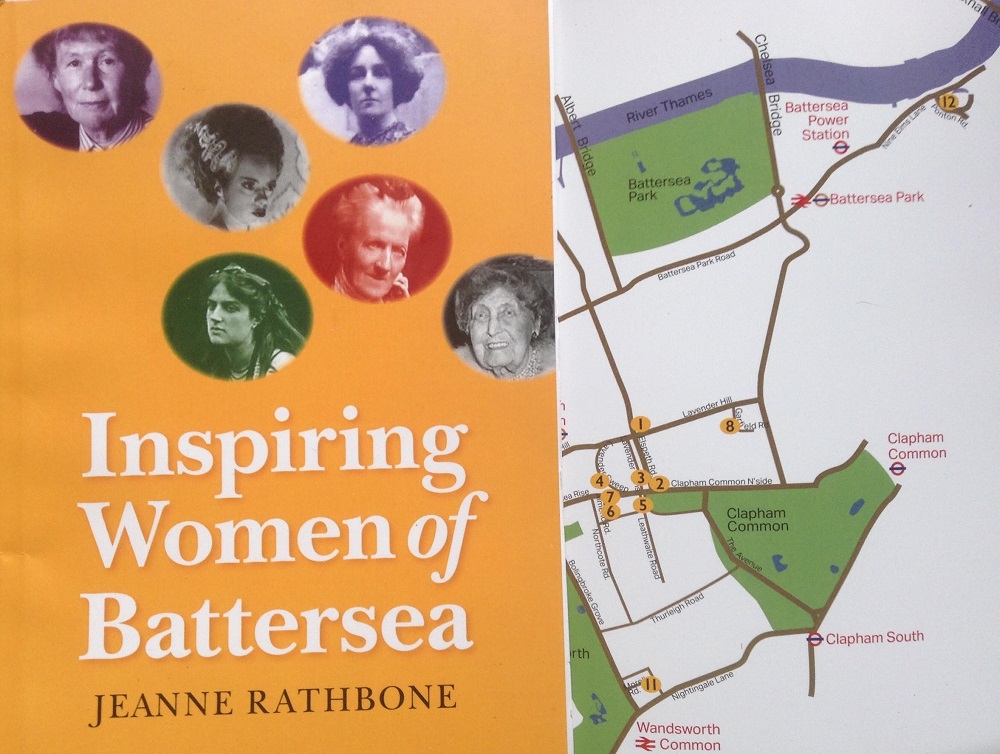
Interview: Jeanne Rathbone
Interview: Jeanne Rathbone
Jeanne Rathbone, an Irish comedian and writer, shares with Hannah Hoeffner her next adventure…
Jeanne Rathbone, formerly from Ireland, emigrated to England during her teenage years in the 60’s. Jeanne, also known as Sheela-Na-Gig, is a writer and former comedian. She used the name “Sheela-Na-Gig” when she pursued comedy in the 90’s, and soon after she trained as a Humanist celebrant, to which she still does today.
Her new book, Inspiring Women of Battersea, evolved from blogs, walks, and talks. She tells us that as a representative for the Battersea Society on Wandsworth Heritage, she was disappointed to see that they didn’t choose women as the theme for their heritage festival in 2018. This is when she decided to take matters into her own hands and chose to do a talk, finding even more inspiring women since.
When picking her top influences, she found it hard to narrow it down. With so many inspiring and motivating women, who can pick just one? One of the many women she was intrigued by was Elsa Lanchester 1902-1986, Hollywood actress, singer and cabaret performer. She found Lanchester to be witty and was captivated by how she still resonates as a cult siren and an LGBTQ icon.
Another icon of hers is Jeanie Senior, a radical Christian socialist. She volunteered in aiding the sick and wounded of the Franco-Prussian War, later becoming the forerunner for the British Red Cross. Jeanne informs us, “Through helping her friend Ocatavia Hill in her social housing project in Marylebone, she was appointed by the radical President of the Local Government Board as inspector of Workhouses thus becoming the first woman in Whitehall”. It was Jeanie Senior who argued for “boarding out” which became fostering and soon set up a befriending service for servant girls. She is now an icon for the late 19th century for women’s equality.
Other women that she was further inspired by are Ida and Louise Cook. Both of them rescued Jews from the Nazis in the 1930’s. It was here that Jeanne shared, “They had to devise ways of smuggling the valuables of the people they rescued – jewellery and fur coats, and also carried messages for underground contacts and had to fundraise and get sponsors in England for those rescued”.
Before becoming an active member of the Battersea Society, Jeanne worked in a laboratory at Gartons Glucose factory, got married and had two children, got involved with the Labour Party, returned to university to achieve a degree in philosophy, had her third child, and then became a Women’s Officer in H&F Council in the 80’s, where she became an alcohol counsellor. It was then that she started to pursue comedy. After, she trained and worked as a Humanist Celebrant, to which she calls “a meandering career”.
She decided on the pseudonym Sheela-Na-Gig. She reckons, “she makes a most suitable role model for a pagan, female, Irish pensioner” like herself. She says that today she still meets people from the comedy world who think her real name is Sheela.
In September of 1991, there was an advertisement for The Mean Fiddler, an open-spot comedy competition. She decided to book herself in, and this is where her career in comedy launched. Rathbone reveals, “The act quickly developed from talking about the Sheela image to using male nudes etc. I honed it on the comedy circuit but soon realised it was no place for a menopausal Irish comedienne – I felt freakish and too lonely.”
Her comedy material consisted of things that are significant to her as a feminist, atheist, and an older Irish woman. She admits that comedy is a powerful and enjoyable way of getting these things across, and that the feeling is great when you can express what you want to say and get laughs as a response. A feeling she calls “multi-orgasmic” or when there are a lot of people, “orgiastic”.
It was after the Edinburgh Festival in ‘96 that she realised she didn’t have the stamina or the passion for comedy as it “is a hostile and tough place for women”. However, she still thinks it was a terrific experience.
What inspired her to be a Humanist celebrant? “In the nineties I had been to some inappropriate religious funerals of people who were not religious and as an atheist I knew that Humanism was for people who eschewed religion and decided to join the British Humanist Association. The information pack they sent had a leaflet on Humanist ceremonies and a call for people who to train as celebrants, though we were called ‘officiants’ then. I trained in 1996 and have conducted hundreds of funerals and some wedding and Namings”.
She dropped out of Humanists UK because she was quoted in a local paper saying that “she didn’t marry virgins”. Rathbone states that this was in the context of Humanist celebrants seeking recognition as wedding registrars. She still conducts a few funerals of families and for friends. The last one she did was for Battersea activist and muralist, Brian Barnes MBE.
Where is she today? “I am living in our house in Lavender Sweep, and have since 1968. I have been an active member of the Battersea Society on heritage giving talks, leading walks particularly on women, our industrial past and organising our own blue commemorative plaque scheme.”
She says there are seventeen English Heritage/LCC plaques in Battersea, but none of them celebrate women, and she’s on a mission to redress that. Their next plaque will be to author and founder of the De Morgan Foundation on Old Battersea House, Wilhelmina Stirling.
Her book, Inspiring Women of Battersea, includes an introduction by Battersea poet, Hilaire who celebrates Battersea women known and unknown, and a foreword by Guardian columnist, Zoe Williams. The book is available to buy from the Battersea Society website for £8.60.






